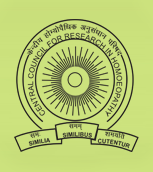Indian Journal of Research in Homoeopathy
Keywords
Arsenicum album, Depressive episode, Homoeopathy, Lycopodium clavatum, Natrum muriaticum, Observational study, Open trial, Phosphorus, Pulsatilla nigricans
Article Type
Original Article
Abstract
Objective: To evaluate the role of homoeopathic medicines in the management of depressive episodes. Material and Methods: A prospective, non-comparative, open-label observational study was carried out from October 2005 to September 2010, by the Central Council for Research in Homoeopathy (CCRH) (India), at - the Central Research Institute CRI (H), Kottayam. Patients who were 20-60 years of age, suffering from mood disorders were screened for inclusion and exclusion criteria. Homoeopathic medicines were prescribed in 30, 200 and 1M potencies, after repertorising the symptoms and signs and final consultation with the Materia Medica. The internationally accepted scales - Hamilton Depression Rating Scale (HDRS), Beck Depression Inventory (BDI) and Clinical Global Impression (CGI) - were used to assess the symptoms at each visit and measure the outcome. The follow up of 12 months included six months of observation period. Analysis was done as per the intention-to-treat (ITT) principle using SPSS version 20. Results: Eighty-three patients (35 males and 48 females), who fulfilled the inclusion and exclusion criteria were enrolled in the study. Out of these, 67 patients completed the follow-up, 16 patients did not attend the Outpatient Department (OPD) for varying periods. The ITT principle was applied for the analysis considering their last observations. A statistically significant (P = 0.0001, P < 0.05) difference in the mean scores of HDRS, using the paired t-test, was observed. The mean scores at baseline and at end were 17.98 ± 4.9 and 5.8 ± 5.9, respectively. Statistically significant differences were also observed in the BDI and CGI scales. The most frequently used medicines were: Natrum muriaticum (n = 18), Arsenicum album (n = 12), Pulsatilla nigricans (n = 11), Lycopodium clavatum (n = 7) and Phosphorus (n = 6). Conclusion: A course of six months of homoeopathic treatment is associated with significant benefits in patients suffering from depressive episodes, as measured by HDRS. Further controlled studies are needed to assess the efficacy .
Digital Object Identifier
10.4103/0974-7168.119117
Publisher
Wolters Kluwer India Pvt. Ltd.
How to cite this article
Oberai P, Balachandran I, Janardhanan Nair K, et al. Homoeopathic management in depressive episodes: A prospective, unicentric, non-comparative, open-label observational study. Indian J Res Homoeopathy 2013;7(3):116-125. doi: 10.4103/0974-7168.119117


